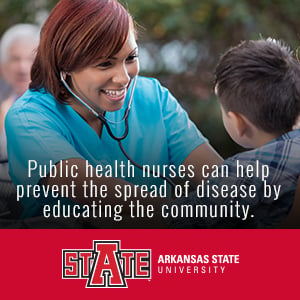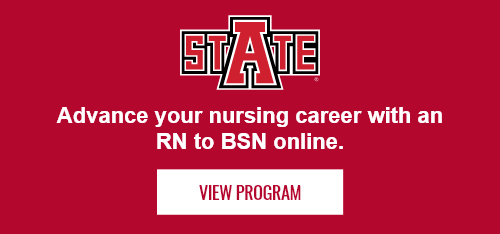
From navigating epidemics to promoting everyday healthy practices, public health nurses are at the very center of keeping communities healthy. Nurses play a significant role in public health by serving in positions of responsibility at public health agencies, nonprofit groups and educational organizations.
Public health nurses help the public stay healthy by assisting with the development, promotion and management of public health initiatives. According to the World Health Organization (WHO), nurses are “often, the first and only point of care in their communities,“ which is the reason for the strong push to greatly increase the resources and funding for more public health nurses.
Public health nursing (PHN) is dedicated to researching and implementing best practices for nurses who work in this field. PHN emphasizes preventive care and basic health education to help communities reduce disease, improve quality of life and enable more people to live healthier lives. With these goals in mind, nurses collaborate with local health departments and other organizations to provide health education, study population health changes, work on disease prevention initiatives, and coordinate similar efforts.
An Overview and History of Public Health and PHN
While improvements in healthcare and scientific knowledge also made an impact, great strides in public health caused significant improvements in life expectancy for many people living in the developed world over the past few centuries. Basic changes such as the introduction of indoor plumbing and better hygiene practices reduced disease transmission and enabled people to live longer and better than ever before.
By the mid-19th century, improved knowledge about disease led local communities to begin implementing significant changes in sanitation. These efforts dramatically reduced contagious disease transmission. Public health began developing as a separate field, and public health workers learned more about disease transmission through populations. Health education for the public became part of public health workers’ arsenal in the fight against contagious illness. Vaccinations, improved sanitation and better hygiene brought many of public health’s most important victories as new longevity and wellness milestones were reached. As well-educated healthcare professionals, nurses are at the forefront of these community efforts and provide essential knowledge and expertise to public health initiatives.
In the 20th century, PHN grew beyond treatment and began tackling the increasingly complex factors that contribute to illness and influence health. Nurses observed the need for greater advocacy within local communities. The impact and potential of healthcare leadership to transform community health led many nurses to see the value in political advocacy, community organization and grassroots educational initiatives. PHN then began to encompass a range of different nurse-led efforts to improve health at the community level. Nurses were encouraged to listen to and empower local community members.
Disease Prevention Today
Public health departments customize their work to fit the communities they serve and the health needs of local populations. Since there are many different possible causes of disease and types of illnesses, public health workers must be able to understand the underlying causes of disease to effectively stop transmission and prevent future cases. Many public health efforts address issues of sanitation, personal interactions, and business or public practices that impact health. Educational campaigns, regulation of industry, and the planning and implementation of sanitation and hygiene initiatives may all fall under local health departments’ responsibilities. Nurses are needed at every level of public health work.
Preventing disease requires that these efforts are well-coordinated and responsive to community needs. When disease outbreaks occur, PHN nurses quickly respond with scientifically sound, sensible means of controlling the spread of illness. Prevention of future outbreaks requires that infection sources are identified and properly managed. For example, foodborne illness may be prevented by training cooks and food-service personnel to properly store, prepare and serve food. Caregivers, childcare workers and others who regularly interact with vulnerable populations may be taught best practices for disease prevention. Presentations to local groups can teach individuals how to care for themselves, keep their families safe and prevent diseases from spreading. These and other campaigns need the specialized knowledge and skills of public health nurses.
The Role of Nurses
Today, public health nurses serve their communities in a variety of positions and provide access to healthcare to vulnerable populations. According to The Future of Nursing 2020-2030: Charting a Path to Achieve Health Equity report by the National Academy of Medicine, “as members of the communities they serve, public health nurses build trust and relationships with individuals and local leaders. They also develop a strong understanding of people‘s experiences, backgrounds, and the social factors that influence health.”
Nurses in this field often serve as leaders, educators, advocates and researchers, all in addition to their nursing roles. Many public health nurses practice, study, develop and lead public health campaigns. Some also teach other nurses, other public health workers and the public at large. Some nurses serve as policy makers and craft legislation that advances the cause of health and wellness. Within local communities, nurses are also needed to teach preventive health practices so more people can live healthy, productive lives.
PHN is a rapidly changing field, reflecting current health challenges, as well as improvements in nursing care, public health knowledge and scientific development. Nurses can work in PHN as generalists or they can pursue advanced education in the field and work as specialists with more significant responsibilities. Typically, PHN jobs require candidates who are flexible and capable of serving as leaders. To advance in the field, nurses should pursue additional PHN education.
Public health nursing is a vital field with strong opportunities. Nurses in this field work closely with local residents, businesses, governments, nonprofit organizations, researchers and other healthcare professionals to help communities become healthier. These nurses can help prevent the spread of disease by providing education, developing programs, supervising health campaigns and contributing their knowledge to public health work. PHN is continuing to change as advancements in the field allow nurses to do even more for community health.
Learn more about the Arkansas State online RN to BSN program.

